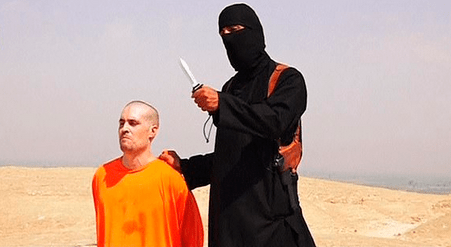
Brother of murdered journalist James Foley watched video of Jihadi John beheading his sibling
The brother of a journalist murdered by ISIS killer Jihadi John has told a terror trial how he watched the clip of his sibling being beheaded multiple times.
Michael Foley made the distressing revelation while testifying against suspected ISIS hostage taker El Shafee Elsheikh, 33, in Virginia Monday.
He also said ransom demands made by the terror group in 2012 and 2013 – including 100 million Euros and the release of Islamist prisoners – showed they were never serious about sparing his late brother James. The war photographer was executed in Raqqa, Syria, in August 2014 aged 40, with footage of his murder horrifying the world.
Michael told the hearing in Alexandria: ‘We had no ability to secure either of those demands. It’s not a reasonable demand. It’s not a negotiation, in my mind.’
He went on to say how he’d first learned of his brother’s death after being called for confirmation by reporters, which was finally provided days later by then-President Barack Obama.
James’ mom Diane Foley also testified, and told of how she spent days hoping her son’s execution was a cruel joke after the video of his final moments began to circulate online.
She recalled desperately trying to call the FBI to find out about her son, only to be fobbed off, with her worst fears later confirmed by Obama. James’s father John Foley also attended Monday’s hearing, but did not take the stand.
Elsheikh, who is British, is accused of being one of the three notorious ISIS ‘Beatles,’ and has been charged with hostage-taking that resulted in the deaths of Foley and three other Americans – Steven Sotloff, Peter Kassig and Kayla Mueller.
Mueller’s parents Carl and Marsha also attended Monday’s hearing. Their daughter, an aid worker, was kidnapped in the Syrian city of Aleppo in August 2013.
She was forced to marry ISIS leader Abu Bakr al-Baghdadi, who raped her, and was murdered in February 2015 aged 26. Also present on Monday was Bethany Haines, whose father David Haines – a British humanitarian – was beheaded in September 2014 aged 44.
James, who was born in New Hampshire, worked as a freelance photographer, and left for Syria in October 2012.
He was well aware of the potential dangers – indeed, he had spent more than a month in captivity in Libya while on assignment during that country’s civil war.
Diane testified that she became deeply concerned about her son when he failed to call them as he usually would on Thanksgiving 2012.
It wasn’t until late November, after Thanksgiving, that they actually received an email from James’ captors seeking to establish a line of communication.
Michael Foley, James’ brother, said the emails exchanged in November 2012 and January 2013 sought either the release of Muslim prisoners or 100 million euros.
The captors did provide evidence that they were in possession of Foley and that he was still alive by giving personal details about James’ life that would have been known only to him and his family.
But despite repeated efforts to engage the hostage-takers in talks, the Foleys received no replies to multiple emails for roughly 8 months. Finally, in August 2014, they received an email titled: ‘A message to the American government and their sheep-like citizens.’
The email criticized the U.S. for a recent bombing campaign that had been undertaken against the Islamic State.
‘As for the scum of your society who are held prisoner by us, THEY DARED TO ENTER THE LION’S DEN AND WHERE (sic) eaten,’ the message said. It promised retaliation, ‘the first of which being the blood of your American citizen, James Foley. He will be executed as a DIRECT result of your transgressions towards us!’
A few days later, Foley was beheaded in a gruesome video broadcast across the Internet.
The refusal to negotiate in serious terms stands in contrast to earlier testimony, where negotiators for European hostages engaged in lengthy discussions that resulted in the release of hostages.
One hostages was released after raising 2 million euros, a negotiated figure that was just a fraction of what was demanded from the Foleys.
Elsheikh is better known as one of ‘the Beatles,’ a nickname he and at least two other Britons were given by their captives because of their accents, with the gang said to have been behind the beheadings of 27 hostages.
Last week, his trial was told of the horrific brutality he allegedly meted out on prisoners, including ‘going away’ batterings for hostages who’d been freed.
Elsheikh is also said to have beaten one hostage 25 times on learning that it was the unnamed captive’s 25th birthday.
Elsheikh and a longtime friend, Alexenda Kotey, were captured together and brought to Virginia to face trial. Kotey pleaded guilty last year in a plea bargain that calls for a life sentence.
A third Beatle, Mohammed Emwazi, served as executioner in the video of Foley’s execution. Emwazi was killed in a drone strike in November 2015, and was the face and voice of some of ISIS’s most horrific execution videos.
There have been conflicting statements during the trial about the existence of a fourth Beatle. An individual previously identified in public discussion as a fourth Beatle, Aine Davis, is serving a prison sentence in Turkey.
Defense lawyers have highlighted the discrepancies over the Beatles’ identities, and say there is insufficient evidence to prove Elsheikh was one of the Beatles who participated in the hostage-taking scheme.
Prosecutors, though, plan to present evidence later in the trial that Elsheikh confessed to his role under questioning from interrogators and in media interviews.
Source: Daily Mail





